SCHOOL OF MEDICINE
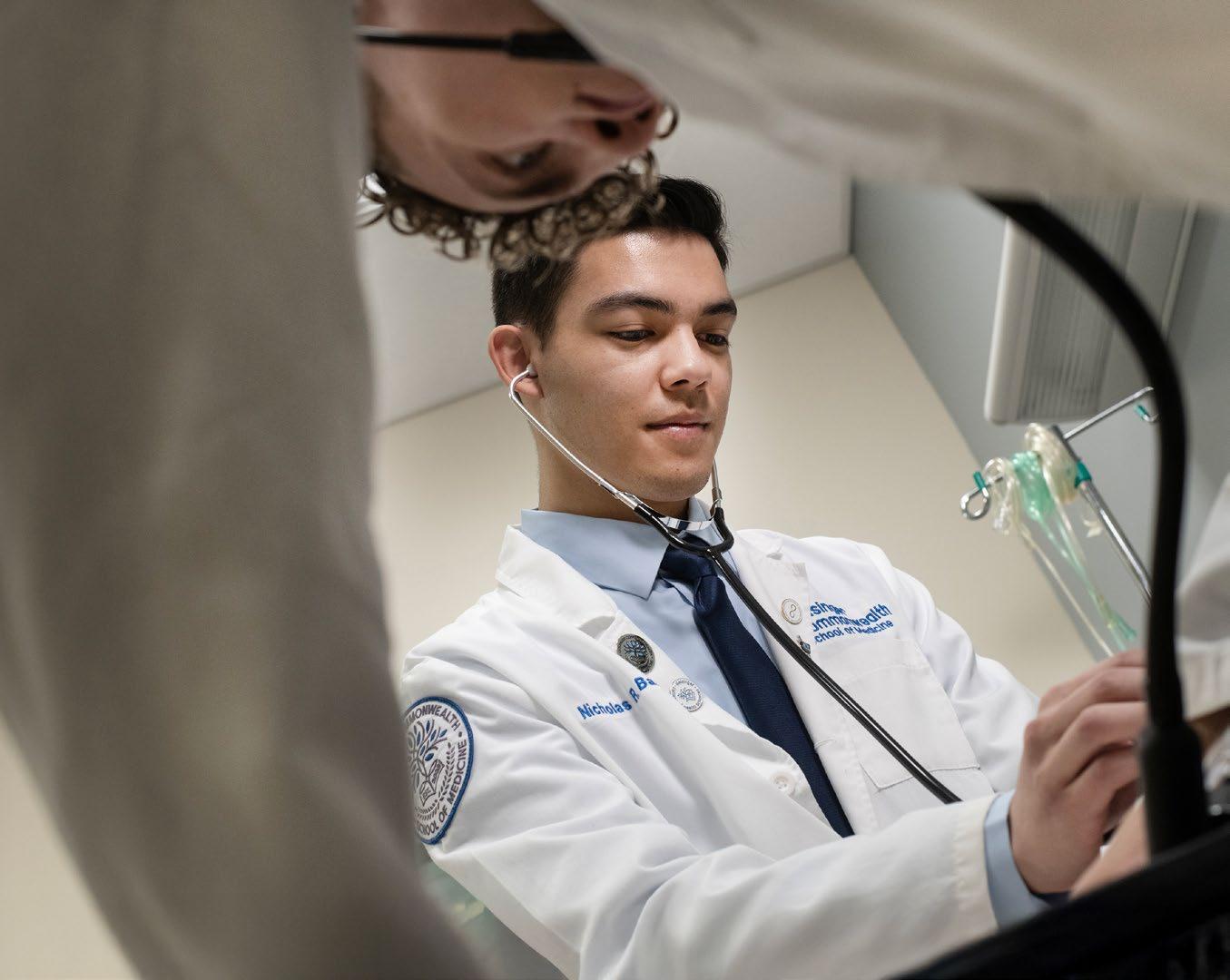


being free to serve the communities you love, working in a system driven by kindness, excellence, learning and innovation — without the burden of overwhelming medical school debt. The Abigail Geisinger Scholars Program offers relief, giving you the opportunity to pursue your dreams without worry.
Geisinger College of Health Sciences is committed to nondiscrimination in all employment and educational programs or activities. Concerns or questions may be directed to the Title IX coordinator whose contact information is available at geisinger.edu/titleix.
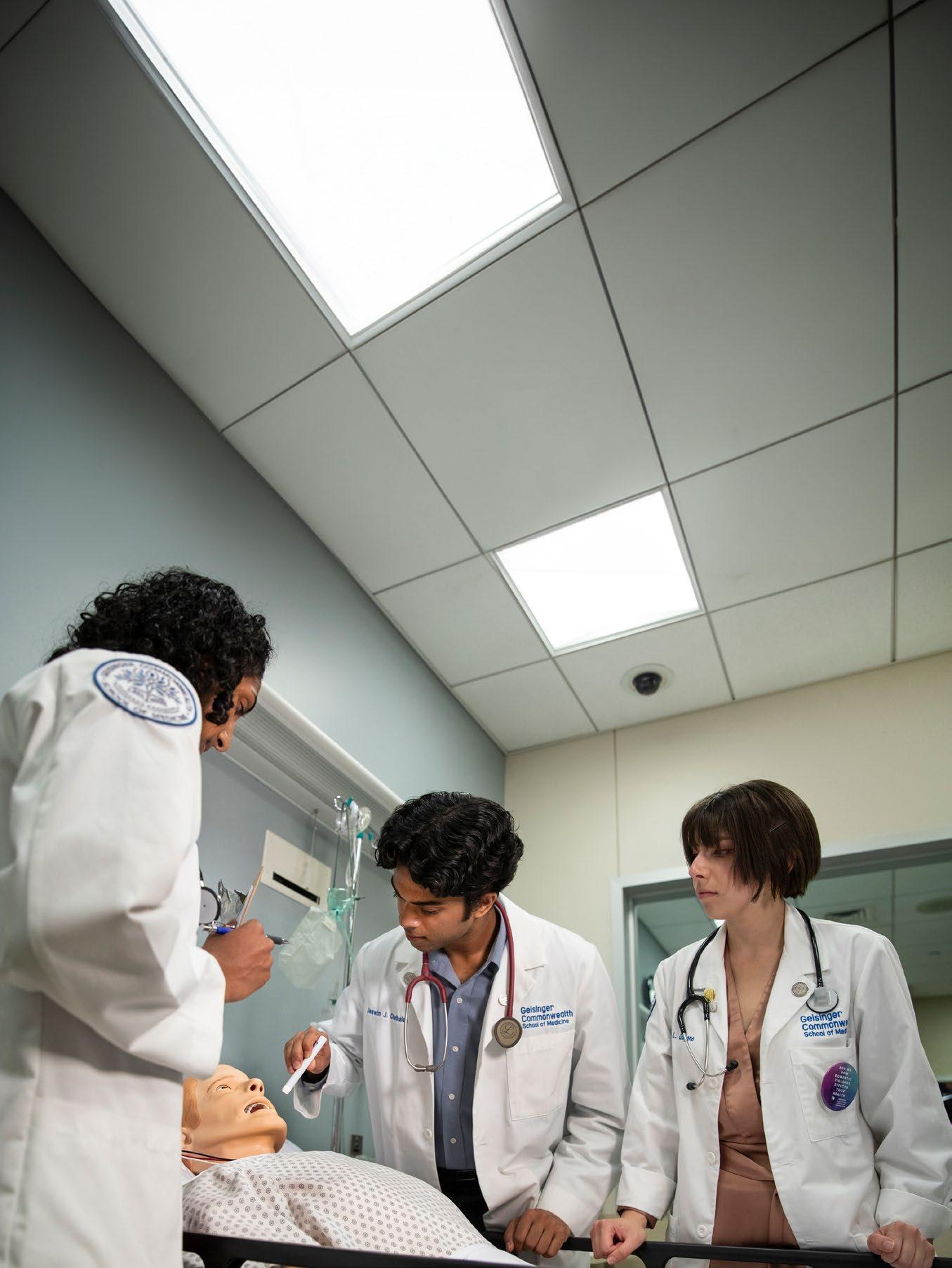
Geisinger College of Health Sciences advances health through exceptional education, research and community engagement. We educate and support compassionate healthcare professionals and scholars dedicated to excellence, discovery and innovation. Our graduates are prepared to improve the quality and value of healthcare, advance equity, address the unique attributes of our region and its people, and promote well-being for all.
Geisinger Commonwealth School of Medicine educates aspiring physicians and scientists to serve society using a community-based, patient-centered, interprofessional and evidence-based model of education that is committed to inclusion, promotes discovery and employs innovative techniques.
Medical students like you share the same dream: A career that builds lifelong personal relationships with patients and places you at the center of your community as a trusted source of knowledge and compassion.
Geisinger supports the ideals of its future doctors by putting primary care and psychiatry where they belong — at the forefront of every innovation and technological advance we make. Through the Abigail Geisinger Scholars Program, we back that pledge with relief from overwhelming medical school debt, as well as a $2,000 per month stipend during your years at Geisinger Commonwealth School of Medicine.
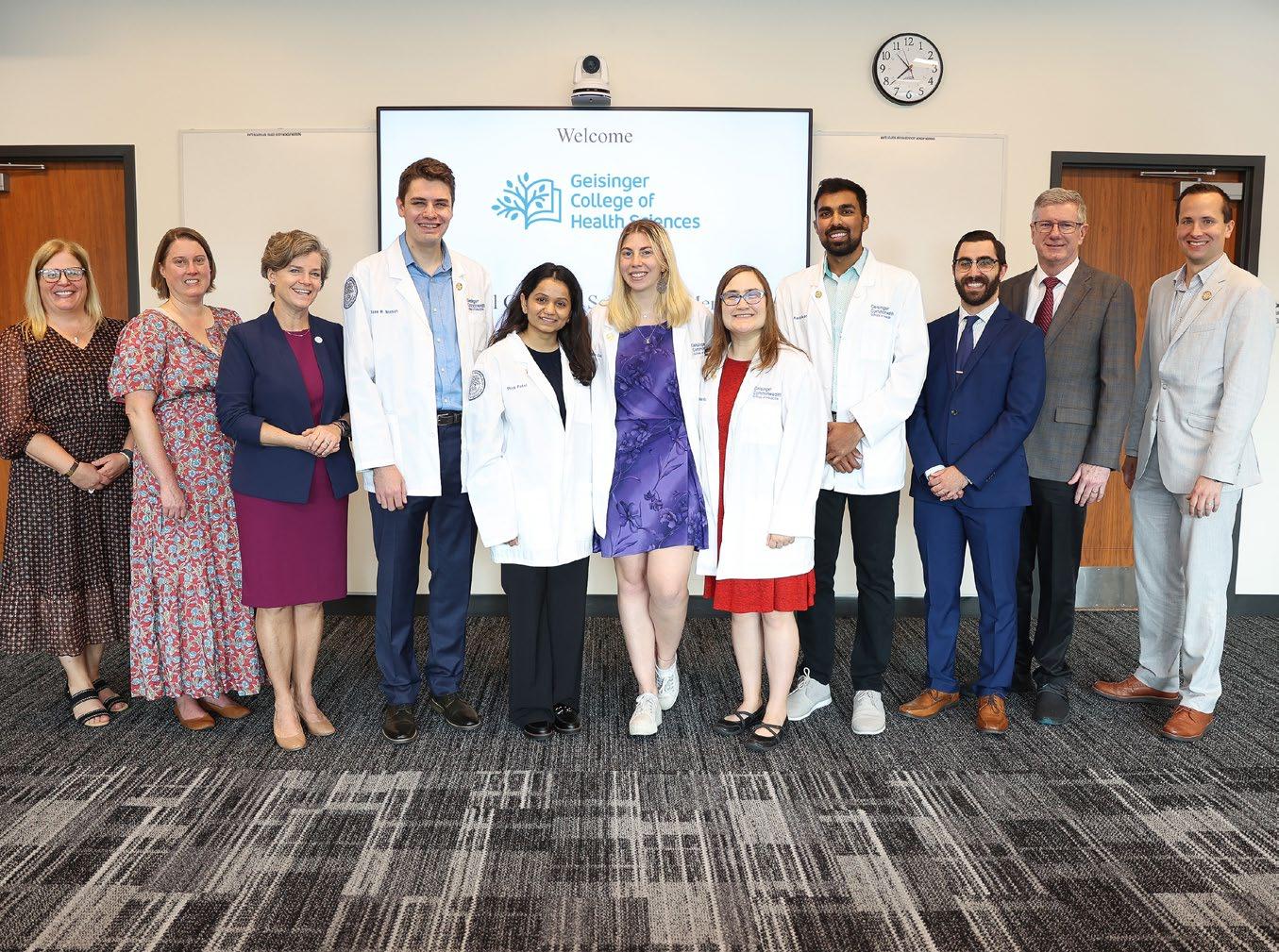

Nia Long has always known she wanted to be a doctor. As a child, she preferred PBS documentaries to cartoons and, when a heart-related health scare sent her to Children’s Hospital of Philadelphia, she formed a lasting, positive impression of the power of medicine. “I ended up being OK, but seeing the families and children there and going through that experience changed me,” she said.
Nia also knew early on that she would practice family medicine. “My experiences kept leading me toward primary care,” she said. “I volunteered at my local homeless shelter and got to see how complex the medical issues were in our homeless populations. So, I knew I wanted to work mostly in community healthcare, but I also wanted to build relationships with patients — not just treating illness and then sending them out to never see them again.”
Nia’s concern for communities in need stems from deep understanding and empathy. “I grew up in a low-income home,” she said. “When I was a kid, we had ups and downs. The electricity was turned off and we almost lost our house. So I am
“My experiences kept leading me toward primary care.”
very sympathetic — I always knew that my own family could be in a homeless situation ourselves.”
As a first-generation-to-college student, Nia received support from her high school, East Stroudsburg High School South, and advisers at The University of Scranton, where she double-majored in neurosciences and philosophy. When it was time to apply to medical school, once again, she knew just what she wanted.
“I was particularly looking for schools with a focus on primary care,” she said. “I also wanted a program that understood rural health. So, Geisinger was always my first choice. Since I went to The University of Scranton, I knew about the special things Geisinger’s been doing, like the Fresh Food Farmacy and some of the other programs. I knew about the Abigail Geisinger Scholars Program, as well. And for someone like me, who already knew I wanted primary care and knew how expensive medical school is — for my family, it was a kind of saving grace to be accepted into the program.”
Now as a second-year medical
student, Nia is looking forward to spending more time in Geisinger’s clinics in Dallas and Tunkhannock that resemble her rural hometown.
“I do think the Scholars Program is exceptional in how they transition students into understanding their path in primary care — getting us involved early and then supporting us throughout that process,” she said. “And I love how Geisinger elevates primary care. Geisinger has turned how we think about medicine on its head by showing just how much primary care helps the community, and how much it helps the people you’re trying to serve.”
In 2017, the Arnold P. Gold Foundation’s Richard Levin, MD, offered a blunt observation: “Doctors enter the profession to help and care for humans,” he said. “They do not sign up to be scribes or billing agents.” His statement struck at the heart of what plagues modern medicine, and particularly primary care and psychiatry — namely, inefficiencies and bureaucratic barriers that frustrate both doctor and patient and make good healthcare anything but easy.
Thanks to Geisinger’s redesign of primary care, the bond between primary care doctor and patient that should be at the heart of good health has been restored. The redesign had two simple goals: to make primary care a joy to practice for doctors and to ramp up the level of care patients received in primary care settings. For patients, this means more intermediate care services, such as IV infusions, and behavioral health services available right in the clinic. For physicians, primary care redesign removed excessive administrative burdens that negatively affect provider well-being.
Today, Geisinger’s transformed clinics are frustrationfree zones staffed by interdisciplinary teams that make primary care easier for patients and more rewarding for doctors. For example, patients long annoyed by having “homework” like getting lab work done or a prescription filled can now get all these services and more in one visit.
Everyone has more time with their doctor, and seniors even get things like social activities and a gym at special Geisinger 65 Forward Health Centers. And the physician inbox that once nagged clinicians with constant electronic chatter is now a responsibility shared among team members.
Three Geisinger hospitals have been recognized in U.S. News & World Report’s list of Best Hospitals 2024-2025:
• Geisinger Medical Center, Danville
• Geisinger Wyoming Valley Medical Center, Wilkes-Barre
• Geisinger Community Medical Center, Scranton
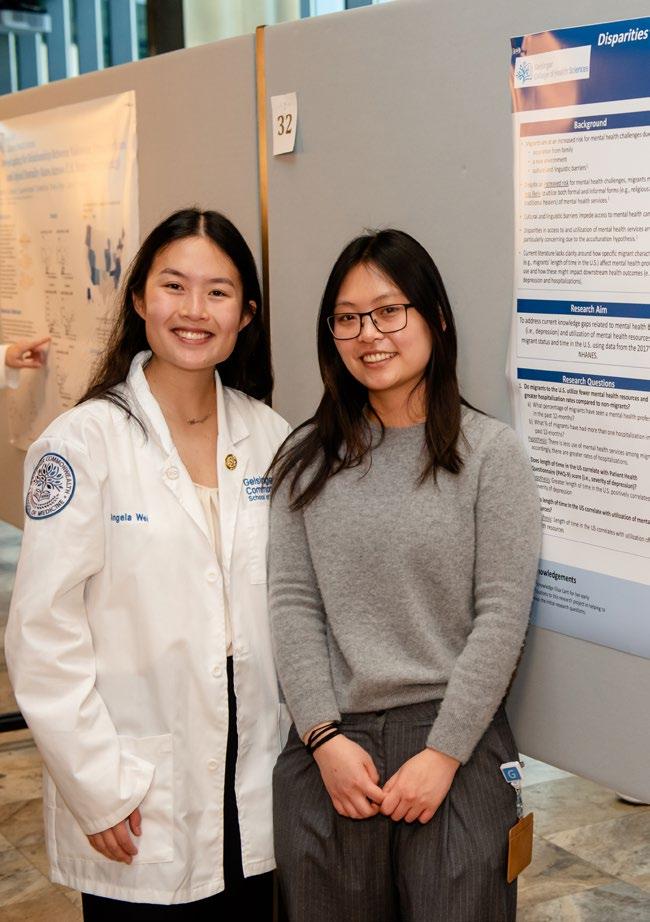
“When I started my career, before primary care redesign, it was up to the physician to get everything done for the patient,” said Kim Kovalick, DO, a family medicine physician at Geisinger Kingston. “Now, we have a care team that collaborates in the care of our patients. From the moment I walk in the door, I have many team members who help me provide great care. For example, a nurse will give recommended immunizations before I even walk in the room. They order blood work and preventive screenings such as mammograms and DEXA/bone density tests. We can take more time with patients with complicated medical conditions and have a team approach to make sure the patient has all the resources they need.”
She added, “If patients have multiple medical problems — congestive heart failure or diabetes, for example — we have a care team that can help out with the patients’ needs. We also have dietitians and medical pharmacists to help educate our patients. All these team members have helped to not only reduce physician burnout, but also improve overall care.”
In 2025, Geisinger Lewistown Hospital ranked among the top 100 rural and community hospitals by Chartis Center for Rural Health.


When Emily Halbedl was applying to medical schools, she sought one with a culture of patient advocacy.
“One of the things that really spoke to me about medicine was being able to explain the science to patients and guide them through tough experiences,” she said. “I want to be that person.”
At Geisinger, Emily found a school that prioritized primary care as much as she does. “I really liked Geisinger’s emphasis on community healthcare, especially with my focus on teaching patients and being there for them in life’s hardest moments.”
As an Abigail Geisinger Scholar, she also fell in love with research, especially in primary prevention of disease. This new interest led to her enter the school’s Medical Research Honors Program (MRHP), a rigorous, thesis-driven program that comes with special honors at graduation.
Rooted in compassion, driven by discovery
“I want to be a patient advocate, and the MRHP advances that,” said Emily, who’s researching the impact of Geisinger’s pediatric weight management program on childhood obesity and comorbidities like diabetes and hypertension.
Between her first and second year at Geisinger, Emily was accepted by the NIDDK Medical Student Research Program in Diabetes at Vanderbilt University. Then, in 2025, the Sarnoff Cardiovascular Research Foundation chose Emily to be a Sarnoff Fellow.
“This fellowship is highly prestigious and a wonderful accomplishment,” said Sonia Lobo, PhD, Emily’s sponsor and the associate dean for research and scholarship at Geisinger College. “Emily will work with top cardiovascular scientists and investigators and have the chance to conduct cutting-edge research.”
Emily is confident her research interests will flourish as a future Geisinger physician. “The more I know, the more I’ll be able to help patients and advocate for them. Because of this, I think research will always play a role in my future career. The more we learn through research, the more we’re able to advance clinical care.”
Abigail Geisinger Scholars have opportunities to take part in clinical research throughout Geisinger.
This program offers nutritious groceries for eligible patients referred by their physician to help better control their diabetes in light of food insecurity. The program also supplies food for the patients’ families. Eligible patients and their families can enjoy better health, which is a priority for Geisinger.
This precision-medicine project analyzes the DNA of registered patient-participants, improving healthcare by finding ways to diagnose medical conditions earlier — even before symptoms appear — and developing new ways to manage these diseases.
These primary care clinics are tailored to meet the unique needs of those age 65+. People get longer appointments, social activities, wellness classes and VIP-level, personalized care. Everything the patient needs is under one roof in a calm, relaxing environment.
LIFE Geisinger is a program for adults 55 and older designed to give patients the support they need to live at home independently while using comprehensive daily living and health services. An experienced team coordinates care based on individual needs, offering caregivers relief and support.
Scholars can take part in experiences at federally funded nonprofit health centers, providing care regardless of a patient’s ability to pay.

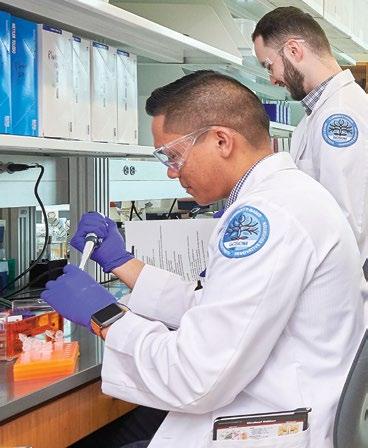
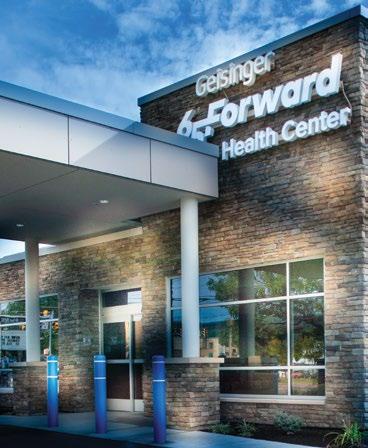

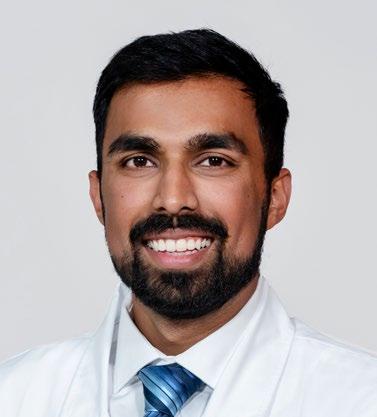
Kevin Sajan was in elementary school when his family emigrated to the U.S. from their farm in rural Kerala, India. The cultural shift was profound, but Kevin is confident his connection to both worlds gives him the empathy and insight to succeed in internal medicine.
“I was able to see the stark differences in medicine — and life — between India and the western world,” he said.
During his summer break between high school and college, Kevin returned to Kerala on a church mission trip. That was the moment he knew he wanted to be a doctor.
“I remember when I was a child and this group came to my village,” he said. “I don’t even know how to describe the experience — I was now in the shoes of someone that I once received care from. It’s given me a unique perspective on the power of connecting with the local community, in their own tongue and already knowing some of the obstacles they were going through.”
When seeking a medical school, Kevin was drawn to Geisinger’s mission and the unique opportunities it offered. He chose the Abigail Geisinger Scholar’s Primary Care 3+3 Accelerated Program, and he’s
already formed a strong bond with Dr. Wasique Mirza, the northeast internal medicine residency program director — something he sees as an incredible bonus. “It’s one of the unique aspects of the 3+3 program. I never imagined being so close with a program director as a medical student. You feel like there’s an advocate for you, there’s someone you can always talk to, and you’re part of the community.”
Early clinical experiences and research are two other “uniquely Geisinger” things Kevin appreciates. “On Mondays I’m in the clinic the whole day. It’s a unique and fulfilling perk. I’m also doing summer research with residents. We’re working one-on-one with them and we’re getting published.”
Kevin loves the variety in his days.
“Internal medicine is a field that touches all aspects of medicine,” Kevin said. “I want a future like that — a mix of everything. I feel like I already have that, thanks to the Abigail Geisinger Scholars Program. The beauty is that you are immediately treated as and given some of the responsibilities of a physician, allowing us to start practicing medicine from day one.”
Abigail Geisinger Scholars accepted to the Primary Care 3 + 3 Accelerated Program complete medical school in three years, followed by a pathway into a three-year residency in one of Geisinger’s following programs:
• Family medicine residency at Geisinger Lewistown Hospital
• Family medicine residency at the Kistler Clinic of Geisinger South Wilkes-Barre
• General internal medicine – Northeast residency at Geisinger Wyoming Valley Medical Center
• General internal medicine – Central residency at Geisinger Medical Center
This means students in the Primary Care 3 + 3 Accelerated Program enter residency one year earlier than their peers, allowing them to start serving their community sooner.
Overview
• Accelerated training allows students to earn their medical degree in 3 years
• Early immersion/orientation with staff/faculty and our residency programs
• Longitudinal Clinical Experience (LCE) at participating residencies early in the curriculum
• Scholarly summer immersion program with participating residencies
• Students spend one half-day per week in a continuity practice aligned with their residency during Phase 2 of the curriculum
• Students meet all medical education program objectives
• Medical school completion in 3 years
• Rigorous programming aimed at time efficiency and robust experiences
• Advising and mentoring by primary care physicians and residents
• Peer collaboration and fellowship
• Pathway into one of four residencies of your medical school training
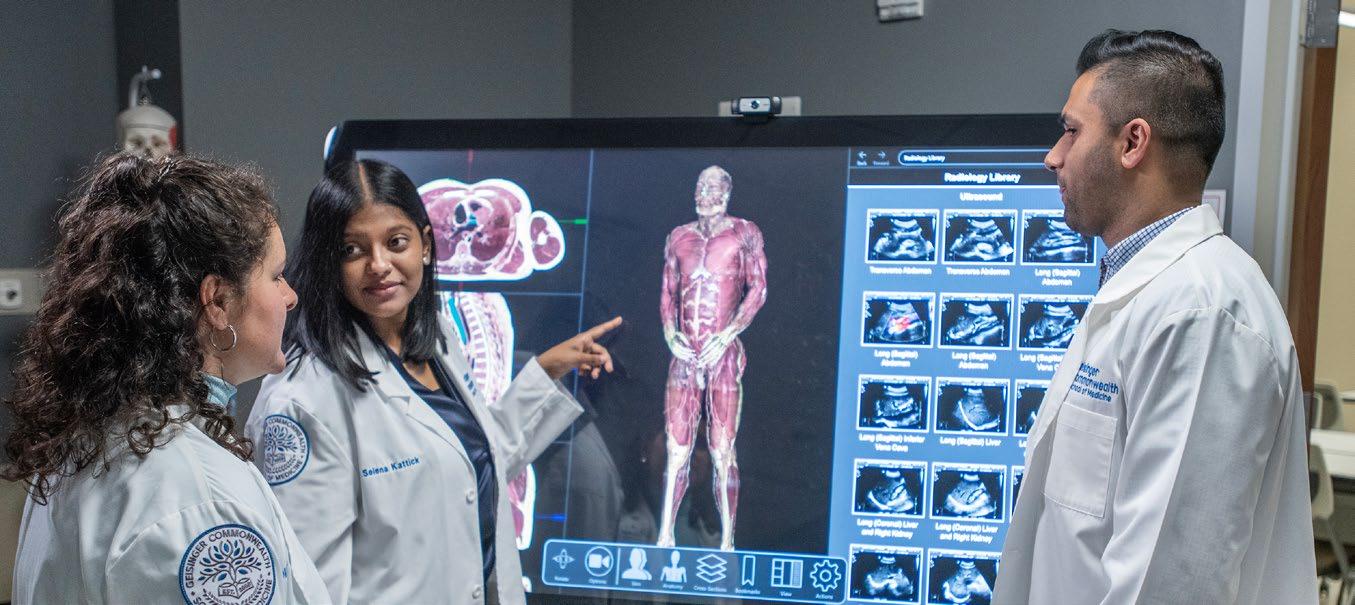
Abigail Geisinger Scholars Program

Admissions
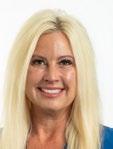
Kim
Kovalick, DO
Assistant Dean of Primary Care Education
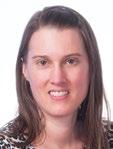
Michelle Schmude,
EdD,
MBA Vice Provost for Enrollment Management
Anja Landis, MD Director of Abigail Geisinger Scholars Program

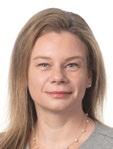
Deirdre Jones Associate Director of Admissions
Nino Cimino Curriculum Coordinator for Primary Care
Geisinger believes the future of medicine lies in robust primary care and psychiatry — care that anticipates and prevents disease, focuses on wellness and recognizes mental health and well-being as fundamental to stronger, more resilient communities. That’s why the Abigail Geisinger Scholars Program focuses on the following specialties:
• Family medicine
• General internal medicine
• Medicine-pediatrics
• Pediatrics
• Psychiatry
There is also a selection process for limited slots in neurology and OB-GYN.
Our program frees medical students from the financial concerns that could derail their dreams. As an Abigail Geisinger Scholar, you will:
• Get relief from overwhelming medical school debt.
• Receive a $2,000 per month stipend.
• Become a Geisinger-employed physician in one of the specialties listed above upon completion of residency training. One year of service equals one year of support.
Interested in applying?
Submit an American Medical College Application Service® (AMCAS®) primary application and Geisinger Commonwealth secondary application.
• Answer “yes” to the first question on the Geisinger Commonwealth secondary application regarding interest in applying for the Abigail Geisinger Scholars Program.
• Complete the question regarding primary care and/or psychiatry and provide any updates to your experiences that align with the Abigail Geisinger Scholars Program.
You are considered for admission into the MD program before interviewing for the Abigail Geisinger Scholars Program. You are selected to participate in this program based on financial need, merit, mission alignment, likelihood of staying at Geisinger beyond the service obligation and interview assessment.
To learn more, visit go.geisinger.edu/abigailcare
525 Pine St. Scranton, PA 18509
Call: 570-504-9068
go.geisinger.edu/abigailcare mdadmissions@geisinger.edu
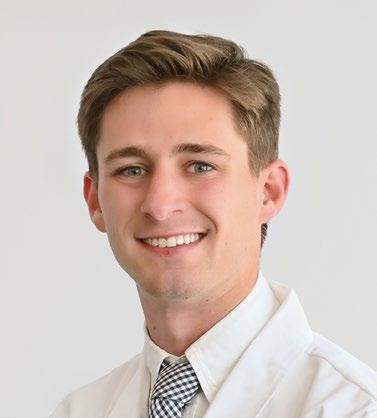
Growing up in Clarks Summit, Pa., Nick Gershey was inspired by the medical school right near his hometown that was gaining distinction for its positive impact. “Having a medical school in this area that’s focused so much on community was a wonderful thing,” he said.
Medicine is the highest form of service
“And, as a kid, thoughts about my future consistently revolved around a desire to give back to the community that raised me. The Abigail Geisinger Scholars Program is an outlet for me to fulfill that goal.”
Nick has worked with Geisinger College of Health Sciences Pathway Programs, volunteering at a middle school. “My community immersion project shows kids they can become the next generation of physicians. We do this by giving presentations on different specialties followed by a fun activity, such as making a spine out of candy.
The intelligence of these young children is impressive!”
Nick is most interested in med-peds as a primary care specialty. He was introduced to it thanks to the seminar series, a unique feature of the Abigail Geisinger Scholars Program.
“We’re able to see why each specialty is so interesting,” Nick says. “When you’re a firstyear medical student, you may or may not really know what each one entails. The medpeds residency director in Danville discussed his work in complex care, and I thought about having the ability to treat either pediatrics or internal medicine and follow patients through that transition of pediatric to adult medicine.”
The seminar series has reinforced the service aspect of medicine for Nick. “Hearing about the lives of these physicians, how they conduct themselves every day and hearing about why they do medicine — it’s been one of the great benefits of the Scholars Program. The program’s focus of bettering the Geisinger community at large is what keeps me motivated in pursuing my goal of becoming a physician.”